In many industrialised countries recycling is part of the daily routine and waste treatment is not a major problem. At least not at first sight. However, this is not the case in all parts of the world. On average, the world’s richest countries consume 10 times more materials than the poorest, which are in turn the source of most of the raw materials then employed in productive processes. Therefore, a global effort is required to move towards a circular economy, making the most of resources in a sustainable manner.
Non-governmental organisations (NGOs) are amongst the forerunners to enhancing social and environmental awareness and behavioural change. Greenpeace campaigning to make smartphones durable and recyclable. The World Wildlife Fund (WWF) launching a circular economy platform – the Cascading Materials Vision – which brings together companies such as Coca-Cola, Nestlé and McDonalds with policymakers and NGOs. The group Friends of the Earth acting to help people reduce consumption, whilst increasing reuse and recycling. In Spain, they have created a business directory to find where to repair, rent, barter or buy second-hand products.
Development and cooperation agencies also have an important role to play. They promote the financing of projects, carry out an advisory role for local authorities and stakeholders, and help improve the technical skills and knowledge of local communities. The United States Agency for International Development (USAID) and the German development agency GIZ are good examples of this, as well as different development initiatives launched by the Dutch Ministry of Foreign Affairs. The United Nations Environment Programme (UNEP) is an important piece of the puzzle too and has established 2018 as “the year of consuming and producing sustainably, a chance to close the loop and bring circularity into our purchasing and consuming behaviour.”
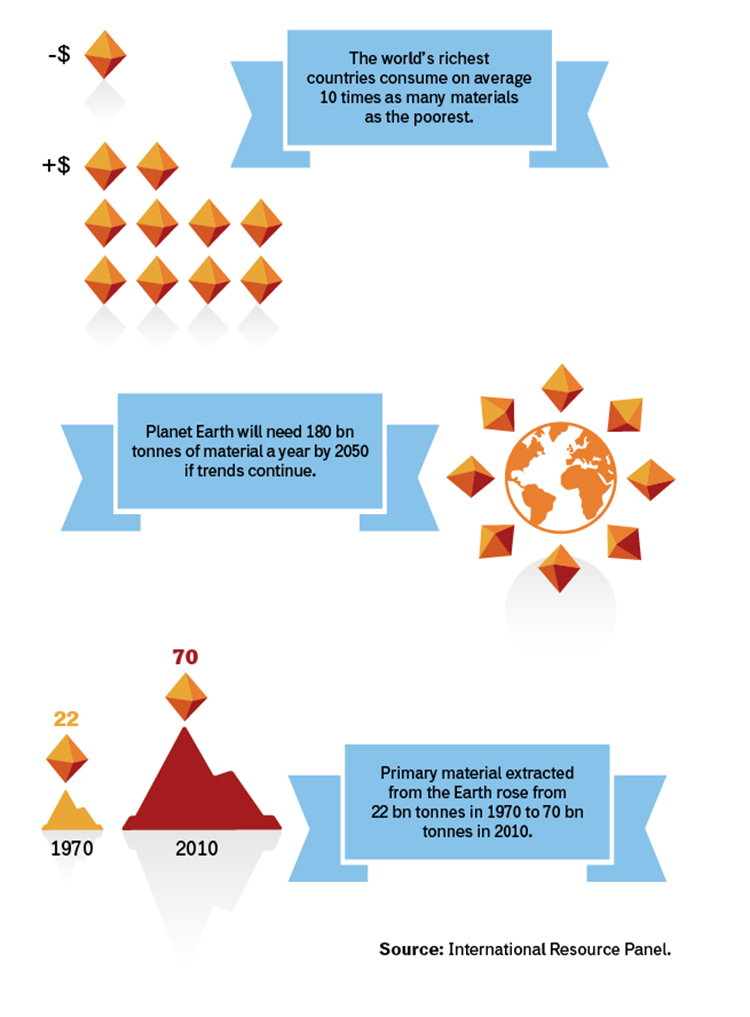
Knowledge transfer and financing
Based on the International Resource Panel’s scientific advice, UNEP provides recommendations to policy makers and businesses, amongst others, to build circularity along different value chains and thus achieve sustainable development. GIZ India has replicated the model and established the Indian Resource Panel to advise the government and relevant actors on resource efficiency and the use of secondary raw materials, beginning in the construction and automotive sector. As a technical cooperation agency, GIZ provides guidance and promotes cooperation with the private sector to enhance local training, knowledge transfer, networking and strategy development. However, GIZ is not responsible for the financing side, which is usually carried out by local partners or other donors such as the German KfW development bank.
With a similar approach, the Dutch government sets out its intention to bring the “Dutch knowledge and experience” abroad, especially to those “countries and local communities that have difficulty coping with the social and environmental impact of the current linear economic system, and where a circular economy could contribute to a local sustainable economy and the security of supply of critical materials,” the official report “A Circular Report in the Netherlands by 2050” reads. In turn, USAID focuses on financing projects that lead to greater resource efficiency and, therefore, to the reduction of environmental impacts and costs. Yet, USAID specifies that it does not seek in any way to promote specific policy approaches.
Waste management
Achieving an adequate waste management system is a primary objective for development agencies. This basic service is key to access clean water, hindering the spread of diseases and improving climate protection whilst reducing greenhouse gas emissions. To top it all off, the use of waste materials can help establish new business models and promote income and employment opportunities in the circular economy. “It is an important development objective,” claims Ellen Gunsilius, GIZ senior advisor on sustainable solid waste management.
GIZ strongly supports waste management programmes in Southeast Europe. In countries such as Albania, Serbia and Kosovo the agency advises stakeholders on the circular economy regulatory framework; supports them in setting up public institutions and improving collaboration with the private sector; as well as implementing awareness campaigns. For example, in Albania the legal framework and strategy on solid waste management is intended to meet EU standards, but it is far from these. The country only has three sanitary landfills and most of the waste is either dumped, ends up in water bodies or burnt. GIZ helps review the strategy and regulations in place, develop a plan to finance the costs of waste management operations and encourage people to separate waste and compost, as well as accept fee payments. Other projects take place in Northern Africa. In Algeria, GIZ works in solid waste management with local municipalities and advises national and local governments on plastic packaging. In Jordan, the agency supports better waste collection and generates valuable jobs in the recycling and waste value chains, not only for the local population but also for the numerous Syrian refugees they host.
Plastic pollution has a central place in the waste management field. UNEP has “declared war on ocean plastic,” through extensive awareness campaigns and in-depth studies on the issue. USAID offers grants and technical assistance to local organisations in Indonesia, the Philippines, Sri Lanka and Vietnam to increase recycling efforts and reduce the amount of plastics entering the oceans. Asian countries are responsible for more than half of the plastic waste in the world’s oceans, and for these countries marine pollution is not only a threat to marine ecosystems, it also means the loss of coastal livelihoods, public health issues and employment problems, as marine pollution impedes the development of local commerce and tourism. In Kosovo, the company Izolimi Plast uses recycled plastic waste as insulation material and has increased its recycling capacity from 300 tonnes per year in 2015 to 1,200 tonnes in 2017 with USAID support.
Still, much work has to be done. Elisa Tonda, the Head of the Responsible Industry and Value Chain Unit in the UNEP Division of Technology, Industry and Economics, claims that: “We are replicating the approach across other sectors.” Fast fashion and electronic waste are some of the next enemies to fight. E-waste, for instance, could go from being a threat to a resource opportunity. “Several of these products still contain very valuable materials, and the reprocessing and extraction of such valuable materials could offer employment opportunities in countries where E-waste currently presents a serious environmental problem,” adds Tonda.
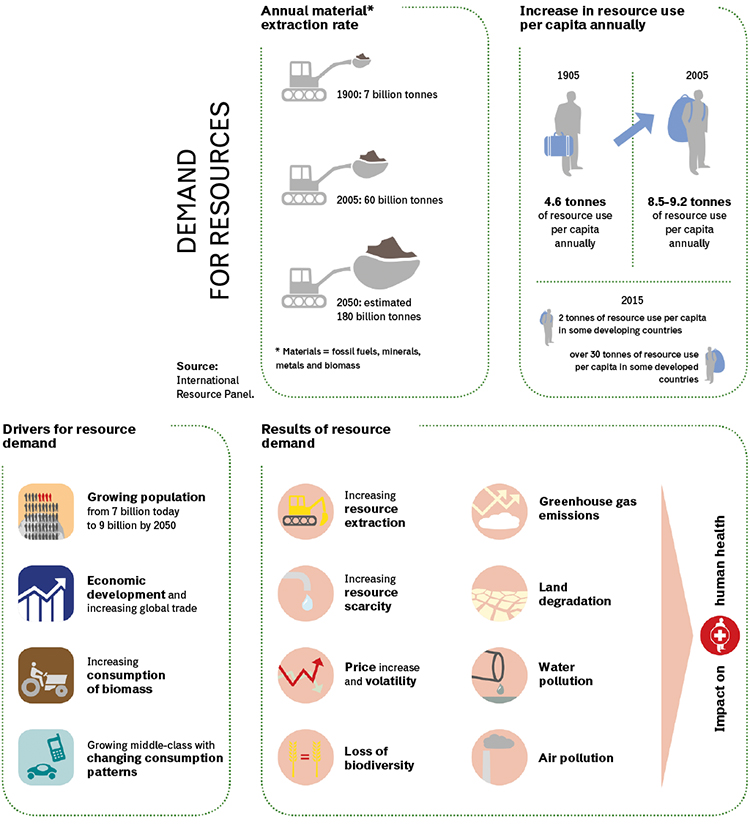
Clean energy
Waste can also generate low carbon energy. GIZ is carrying out a project in Mexico that advises the government on the energy value of waste. USAID has financed the production of biodigesters in Cambodia, which consist of a large tank that converts manure and biowaste into clean biogas for cooking and organic fertiliser for crops. In this way, a typical Cambodian rural family with three heads of cattle will be able to meet their daily cooking needs. As part of the programme “Securing Water for Food: A Grand Challenge for Development,” the US agency also supports compost production for the cultivation of vegetables in India through the recycling of households blackwater and greywater.
As in most cooperation and development areas, many challenges remain to continue supporting a circular system: funding, lack of capacity and low awareness are just a few. However, support is gaining momentum and moving forward. In 2017, the head of UNEP initiated a public-private partnership with Philips and the Global Environment Facility, with the aim of eliminating obstacles to a circular economy. Experts agree that a circular economy is not only about funding new technologies, but also – and mainly – about changing our consumption patterns. And, of course, collaborating and joining efforts. “Unless we all come together in a collaborative way of working, where we really see what the gaps are and address them and which are the areas that are not covered to ensure the circularity of that system, it is very difficult for this to work,” concludes Tonda.
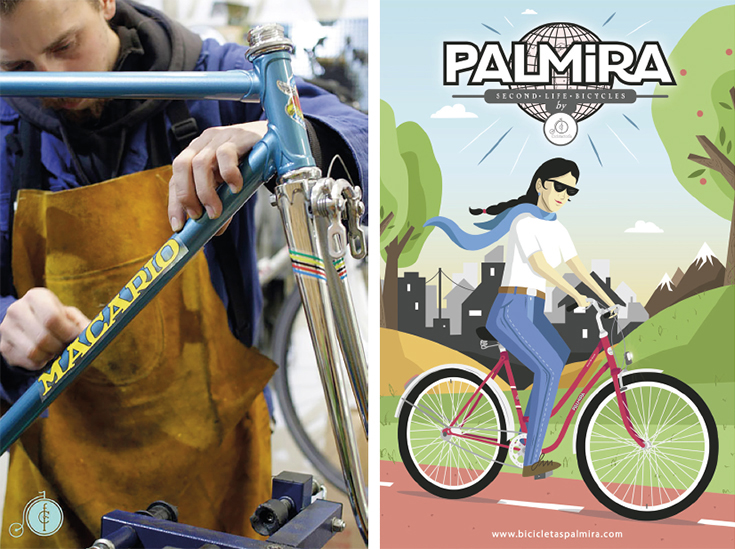 |
|
Ciclofactoria, a bike business included in the Friends of the Earth Spain directory. Credit Ciclofactoria
|
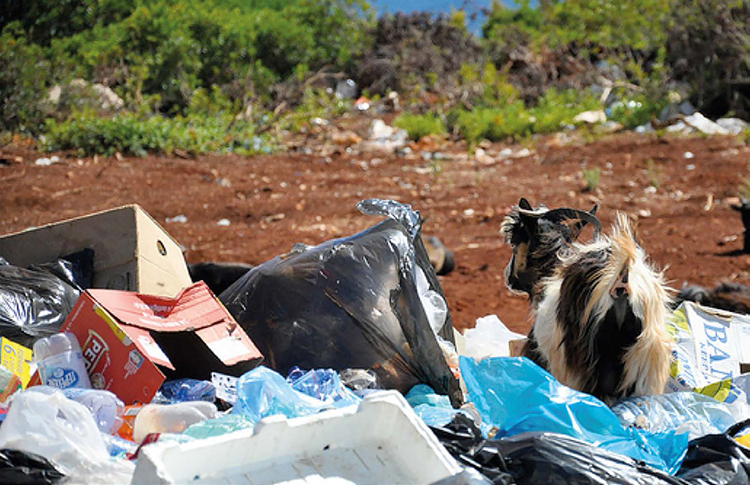 |
|
Waste in Albania. Credit MatHelium
|
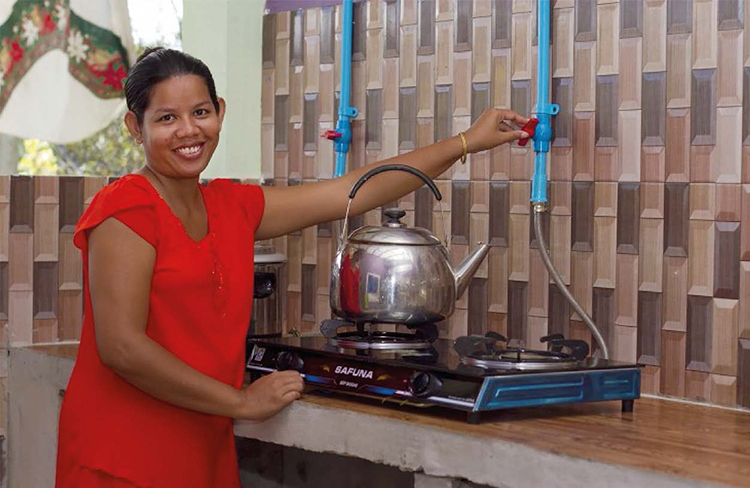 |
|
Combined with a clean cookstove, a biodigester system creates a smoke-free cooking environment, producing benefits to respiratory health and safety. Credit USAID PFAN
|
The Cascading Materials Vision, www.worldwildlife.org/projects/cascading-materials-extending-the-life-of-our-natural-resources
Top image: United Nations flag. Credit Sanjitbakshi

